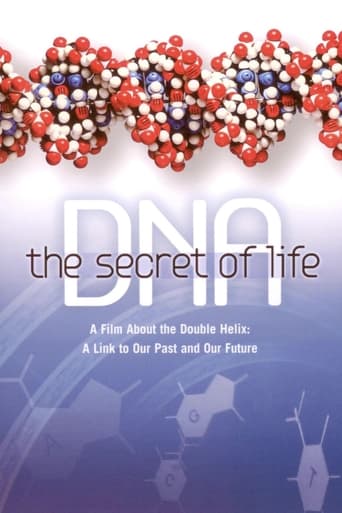
Rating:
0/10 by 0 users
DNA (2003)
DNA is a 5 part PBS documentary special which presents a comprehensive history of DNA science - from the discovery of the double helix structure to the mapping of the human genome to the latest research in the field of human genetics.
Writing:
Release Date:
Sat, Apr 12, 2003
Country: US | GB
Language: En
Runtime:
Country: US | GB
Language: En
Runtime:
Jeff Goldblum
Narrator
Season 1:

The discovery of the double helix structure of dna is to science what the mona lisa is to painting. It's been called the single biggest discovery of all time. But it wasn't just stumbled upon - it was a race. Specifically, it was a race between two teams of young scientists working in Britain, as well as the esteemed chemist Linus Pauling, based in California.

In 1973, two scientists undertook an experiment that rocked the world. By transfering the DNA from one species to another, Herb Boyer and Stan Cohen became the first genetic enginereers. Their experiment triggered a wave of contriversy about the dangers of genetic manipulation, but it also generated a multi billion dollar industry.

In the 1990's the race to work out the structure of DNA fifty years ago was eclipsed by another race: to catalog all the genes in the human genome. the rivalry became so bitter that presidents and prime ministers had to intervene in an epic endevor that would take over a decade to complete and cost billions of dollars.

Bud Romine was diagnosed with incurable cancer in 1994. He was given three years to live. in 1996 a newspaper article caught his eye. The article described the work of a local doctor, Brian Druker, who was testing a new kind of cancer drug. In 1997, months away from death, Bud Romine became the first patient ever to take Gleevec. Within 17 days, Bud had returned to perfect health. Indeed, the drug seems to cure everyone with Bud's disease -- Chronic Myeloid Leukemia -- by fixing the DNA that causes it.

We asked Jim Watson to give us a tour of the future. He belives DNA science should be used to change the human race. His views are both extraordinary and extremely controversial. Watson argues for a new kind of eugenics -- where parents are allowed to choose the DNA of their children -- to make them healthier, more intelligent, even better looking. His vision may be disagreeable, yet it's a natural consequence of the decades of scientific exploration launched by his and Francis Crick's discovery of the double helix. It's worth considering what effect the advancements in genetic science may have on our future


